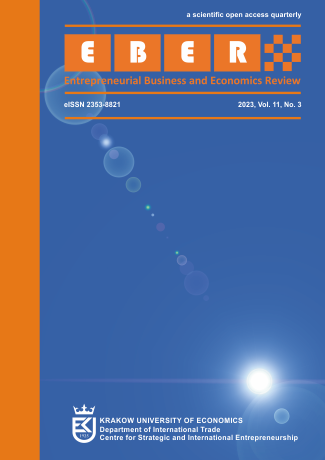The regional environment of smart organisations
as a source for entrepreneurship development in the EU
The regional environment of smart organisations
as a source for entrepreneurship development in the EU
Author(s): Agnieszka Komór, Tomasz Pilewicz, Patrycjusz ZarębskiSubject(s): National Economy, Supranational / Global Economy, Business Economy / Management
Published by: Uniwersytet Ekonomiczny w Krakowie
Keywords: smart organisation; entrepreneurship; development potential; EU regions; location; innovative enterprise;
Summary/Abstract: Objective: The objective of this article is to investigate the relationship between the wealth of the regional environment of a smart organisation and the entrepreneurship level, based on examples of EU regions. Research Design & Methods: This article is based on a quantitative, cartographic analysis combined with a crit- ical analysis of the literature on the subject. Using the method of linear ordering of standardised summary data based on data for European regions, an innovative model of smart IT resources, knowledge and relationships were developed to study their impact on the development of entrepreneurship and innovative enterprises. The model was tested for three groups of firms: in general aggregation, groups engaged in product innovation, and groups engaged in business innovation. The study covered data for 240 regions from 22 EU member states. Findings: The literature lacks a clear definition and measurement methods for smart organizations. The most important resources for their development are relational, IT, human and Research and Development capital, which are also crucial for modern companies. There is no correlation between a region’s prosperity and overall entrepreneurship, but there is a clear link between high potential for smart organization development and smart business development. Research shows a link between innovative enterprise development and IT, rela- tional capital and scientific research capital.Implications & Recommendations: Smart organizations in innovative environments drive socioeconomic devel- opment through technological entrepreneurship and digital equivalents of traditional products and services. Dig- italization of the economy through smart organizations is crucial for micro and meso-level competitive ad- vantage. To identify key mechanisms, public statistics must be adapted to the needs of the digital economy. Contribution & Value Added: This article proposes measuring the relationship between regional potential for smart organizations and entrepreneurship, with a new methodology and approach to support regional man- agement in digitalization. It highlights that IT, human, and research and development capital are key factors for entrepreneurship, and offers a new definition of entrepreneurship. The article also identifies a research gap in the theory of locating innovative enterprises.
Journal: Entrepreneurial Business and Economics Review
- Issue Year: 11/2023
- Issue No: 3
- Page Range: 143-162
- Page Count: 20
- Language: English

